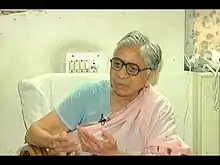Ranganayakamma
Muppala Ranganayakamma (Telugu: రంగనాయకమ్మ; mononymously known as Ranganayakamma; born 1939) is a leading Telugu-Marxist writer and critic.

Early life
Ranganayakamma was born in Bommidi village near Tadepalligudem in West Godavari district of Andhra Pradesh. She passed SSLC (Secondary School Leaving Certificate) examination in 1955. She could not continue her studies because her parents could not financially afford to send her to a far-off college.[1]
Personal life
Her marriage was a traditionally arranged one. Due to contradictions, she left the first marriage after 12 years (1958-1970) and came to be known as "Ranganayakamma" ("Muppala" was the surname of her first husband).
Career
She has been writing since 1955. To date, she has written about 15 novels, 70 short stories, and many essays. She published about 60 volumes in all. The main theme in her works is gender equality and the depiction of women's family life in India.
She came into contact with Marxism in 1973 and began to write from that perspective since then. She is best known for her work Ramayana Vishavruksham (meaning "Ramayana: The Poisonous Tree"), published in 1974, criticizing the Hindu epic Ramayana from Marxist point of view. This book was a three volume series and is now (since March 2005) available as a single volume with 746 pages in Royal size. This book is now (since August 2004) available in English. According to an article featured on her own website, she "receives letters from readers saying that they have converted into ‘self-proclaimed rationalists’ and Marxists after reading [Ramayana Vishavruksham]."[2]
Another important writing of hers is the Marx Capital parichayam, an introduction to Marx's Das Kapital in 3 volumes. The first volume was published in 1978 and there were no Telugu translations of Das Kapital available at that time. She wrote a three-volume novel Janaki Vimukti (meaning "Emanicipation of Janaki"), arguing that Marxism is the correct path to gender equality.
The most outstanding feature of Ranganayakamma's writings is that she writes in the most lucid manner, and even her opponents acknowledge this fact.[3] Her readers and friends maintain a website (www.ranganayakamma.org) hosting details of her works.
She won the Andhra Pradesh Government Sahitya Akademi Award for the novel Balipeetam in 1965. However, since she came into contact with Marxism, she started opposing awards, whether governmental or non-governmental. She minimised writing novels as she felt there is a lot of work to do for marxism and introducing Marxism to Telugu people.She emphasised the fact that unless the proletariat knows the basic ideology of communism,Any revolution will not sustain.Her point of view is well reflected in her works like China lo Em Jarugutundi (What's happening in China)and Soviet Russia lo em jarigindi(What happened in Soviet Russia).Both books are introduction for Charles Bethalham's works.
Literary works
- Janaki Vimukti (జానకి విముక్తి)
- Rachayitri (రచయత్రి)
- Balipeetham (బలిపీఠం)
- Krishnaveni (క్రిష్ణవేణి)
- Pekamedalu (పేకమేడలు)
- Koolina Godalu (కూలిన గోడలు)
- Stree (స్త్రీ)
- Poola Rangadu ( movie dialogues)
- Chaduvukunna Kamala (చదువుకున్న కమల)
- Kala Enduku (కళ ఎందుకు)
- Sweet Home (స్వీట్ హోం)
- Andhakaaramlo (అంధకారంలో)
- Ramayana Vishavruksham (రామాయణ విషవృక్షం)
- Vedalu Em Chepthunnayi (వేదాలు ఏం చెప్తున్నాయి?)
- Donga Thallithandrulu Untaru Jagratha (దొంగ తల్లితంద్రులు ఉంటారు జగ్రత్త!)
- Idandee Mahabharatam (ఇదండీ మహాభారతం)
Marxism related works
- Capital Parichayam (Part 1 and Part 2) (కాపిటల్ పరిచయం [1,2 భాగాలు])
- Chinalo Em Jarugutundi (చైనాలో ఏం జరుగుతోంది?)
- Soviet Russia lo Em Jarigindi (సోవియెట్ రష్యాలో ఏం జరిగింది?)
- Communist party Ela undakudadu (కమ్మూనిస్ట్ పార్టీ ఎలా ఉండకూడదు?)
- China lo Samskrithika Viplavam (ఛైనా లో సాంస్కృతిక విప్లవం)
- Paris Commune (పారిస్ కమ్మ్యూన్)
- Communist party manifesto (కమ్మ్యూనిస్ట్ పార్టీ మానిఫెస్టో)
- Pillala Kosam Arthasastram (పిల్లల కోసం అర్థశాస్త్రం)
References
- Political Biography of Ranganayakamma
- Ramanya Rapper Sells in Andhra
- "Reply To Ranganayakamma About Vedas In Telugu". World News. Retrieved 25 May 2019.
External links
- Works by or about Ranganayakamma in libraries (WorldCat catalog)
- http://kinige.com/kbrowse.php?via=author&id=181 author books details